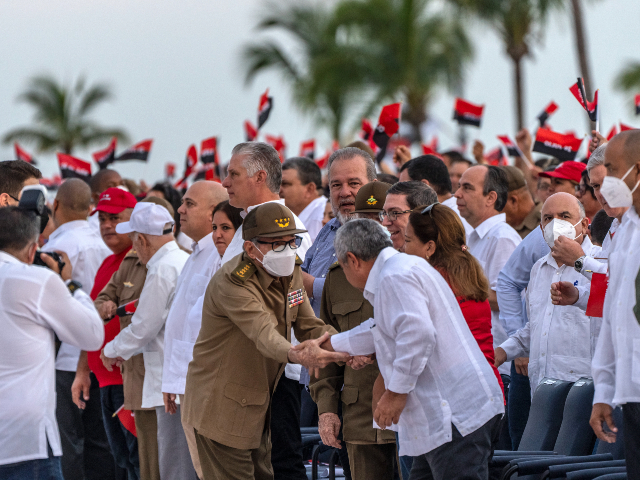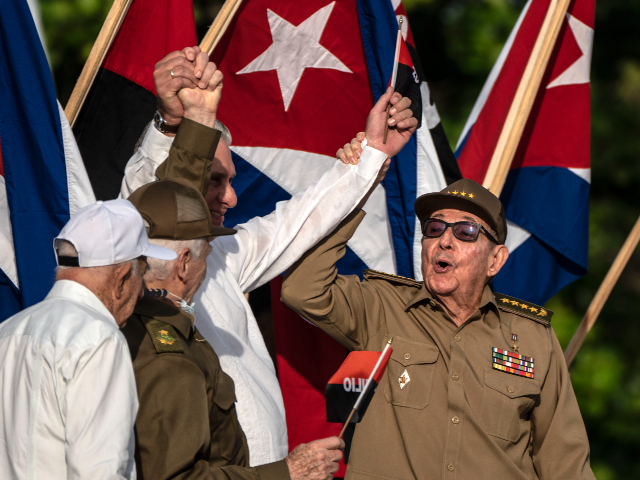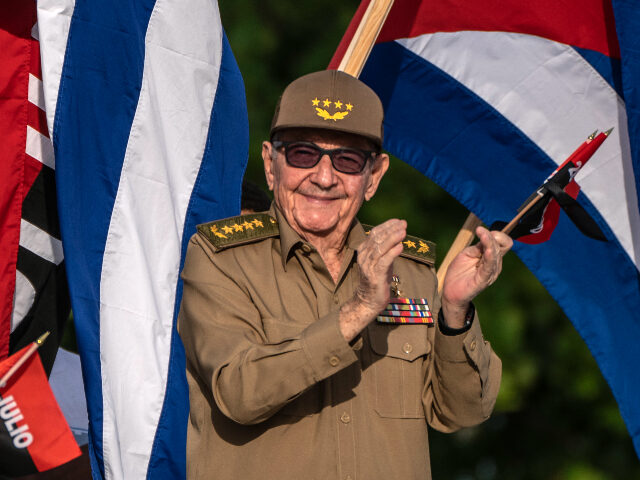Former dictator Raúl Castro, 91, being “nominated” to “run” in an “election” for a seat in the Cuban national legislature is an indication that the Communist Party never prepared a competent successor and the regime may not survive with a Castro family member at the helm, experts and human rights activists told Breitbart News this week.
Castro was one of the original communist rebels who took down the government of then-President Fulgencio Batista in 1959, alongside his brother, longtime dictator Fidel Castro. The younger Castro developed a reputation for extreme brutality, running the firing squads alongside mass murderer Ernesto “Che” Guevara, and only rose to power in 2016, following the announced death of his brother.
Castro claimed to retire in 2021, offering his “modest contribution” to communism “until the end of his life” but symbolically leaving then-little-known figurehead Miguel Díaz-Canel as the “president” of the country. The Díaz-Canel era has been defined by large-scale disasters and the eruption of a nationwide protest movement, fueled but ideological resistance and religious revival, that has continued unabated since July 2021.
The government’s decay has leaked into the daily lives of Cuba’s communist elite – the top priority of the oligarchical Castro regime – as blackouts become a daily occurrence even in privileged neighborhoods and luxury hotels collapse from negligence.

Former Cuban President Raul Castro, front left, greets people accompanied by Cuban President Miguel Diaz-Canel, behind him, during celebrations for the 69th anniversary of the Moncada Barracks assault in Cienfuegos, Cuba, Tuesday, July 26, 2022. Cuba marks the anniversary of the 1953 rebel attack led by Fidel and Raul Castro on the Moncada military barracks, considered the start of Fidel Castro’s revolution that culminated with dictator Fulgencio Batista’s ouster. (AP Photo/Ramon Espinosa)
Last week, shortly after a 2022 in which human rights groups documented nearly 4,000 protests against communism on the island, the official newspaper of the Party, Granma, announced that Raúl Castro had been “nominated” to become a lawmaker in Cuba’s National Assembly. As Cuba is a repressive authoritarian regime, its legislative “elections” are a mirage: the Party “nominates” candidates in each region to be the only names on the ballot, then pressures residents to participate in the “elections” to simulate high turnout. There is no scenario in which Castro could lose his “election” to the Assembly.
Attempts to inspire renewed excitement for younger communist icons in the Party have largely failed. A new initiative surfaced alongside Castro’s return – a potential changing of the guard from Díaz-Canel’s boomers to Cuban Millennial Elián González. González is likely best remembered in America as the child who, in 2000, was violently ripped out of his family’s hands and deported back to Cuba by leftist American President Bill Clinton, condemned to serve a lifetime as a mascot of the regime. González, whose mother drowned in her attempt to bring him to America, regularly appeared in state propaganda enthusiastically proclaiming the greatness of Fidel Castro.
González will also be on the “ballot” this year for a seat in the Assembly, and specifically expressed excitement at serving with Raúl Castro, but not Díaz-Canel.
“The fact that I will share in a part of the historic direction fills me with pride,” González said this week, “knowing that Raúl will be there doubles my joy because we will have experience and the example at our side still and I know I will be in that hall with our army general.”
While Cuban state media comically tried to promote this year’s “elections,” set for March 26, as featuring a new generation of leaders on the ballot, Castro was not even the only nonagenarian to “run.” Ramiro Valdés, a 90-year-old Castro family lackey who participated in the initial 1959 takeover, will also enter the National Assembly this year.
The sudden reemergence of geriatric but reliable communist characters is a sign that the Castro family failed to properly prepare the next generation of leaders – and the regime may not survive their inevitable death, human rights activists with expertise on Cuba told Breitbart News.
“Raul Castro never left, he never gave up power, he never ceded control,” Javier Larrondo, the president of the human rights organization Prisoners Defenders, which advocates for dissidents in Cuba, told Breitbart News. “The potential greater public participation of Raul in these moments, yes, it seems clear, is to generate a greater physical presence in the apparatus to prevent fractures in the regime.”
“Without the presence of the surviving Castro brother, co-founder of the regime, everything becomes uncertain,” Orlando Gutiérrez-Boronat, the co-founder of the Cuban Democratic Directorate (Directorio) and head of the Assembly of the Cuban Resistance coalition, explained. “Raúl Castro must remain in charge because there is never anyone who can fully replace him.”
“There is no one to fully replace him because the Castro family and their clique of generals and Communist Party managers don’t trust anyone,” he emphasized.
Daniel Llorente Miranda, a Cuban dissident who made international headlines in 2017 by single-handedly interrupting Havana’s annual May Day protest waving an American flag, recalled to Breitbart News that the personality cult around the Castro family is stronger than any ideological ties Cuban may have to communism.

Former Cuban President Raul Castro, right, raises the hand of Cuban President Miguel Diaz-Canel during celebrations of the 69th anniversary of the Moncada Barracks assault in Cienfuegos, Cuba, Tuesday, July 26, 2022. Cuba marks the 69th anniversary of the 1953 rebel attack led by Fidel and Raul Castro on the Moncada military barracks, considered the start of Fidel Castro’s revolution that culminated with dictator Fulgencio Batista’s ouster. (AP Photo/Ramon Espinosa)
“First of all, the Castro dictatorship has as its ideological base the image of Fidel and Raúl,” he explained. “Once these physically disappear, this creates disillusion among its followers who, like fanatics, defend not reality, but the image of these two men.”
Part of the reason for a lack of viable alternative to the Castros, Gutiérrez-Boronat contended, is that the Cuban people had not allowed the stranglehold necessary over their country such that it no longer mattered who was in charge of the Communist Party.
“The resistance of the Cuban people against communism has been of such great tenacity that the regime has never been able to institutionalize its functions as, say the Soviet Union and Communist China did,” he explained. As a result, authorities like Raúl remain the chief figureheads even to younger generations of apparently loyal communists.
Larrondo made the case that the erosion of quality of life in Cuba has been so stark under Díaz-Canel, specifically, that only a Castro could restore iron-fisted rule.
“What has been done in Cuba since 2020 has not given anyone a pass – not the leaders, not the officials, not Cuban families. The disaster of the currency change. The disaster of turning artists in Cuba into the enemy,” he explained. “The disaster of losing the support of the few who supported the regime, the execution of various generals, the imprisonment of so many innocent families in a scandalously shameful way.”
“The regime has nowhere to sustain itself. No ideology, no money. All it has is weapons. Without Raul Castro, and he knows it, the regime has its days numbered,” he concluded. “The issue here is that Raul himself has, at 91 years old, his own days numbered.”
Miranda described Cuba, which the regime removed him from at gunpoint in 2019 and forced him on a one-way ticket to Guyana – as being in a “critical process of radical change in society, and everything the dictatorship does is well thought out.”
“Raul is the most important link in all that chain mail where many factors, people, and global organizations are at play. He’s not going to stay relaxing at home,” Miranda predicted.

COMMENTS
Please let us know if you're having issues with commenting.